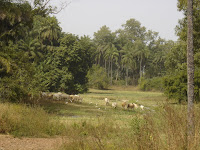
We've been working pretty hard on our project. I seem to spend most of time writting reports. We are hopefully now at the point of forming a partnership with a local bee-keeping association which we have found. Understanding the international development business has been a very steep learning. So much of it is corrupt, enept, inefiecient, and more importantly misdirected and damaging.
From what we've seen here in the Gambia, many NGO's like to build buildings - the reasons behind this are multiple: clear-cut budget over a finite time, everyone can see that you did it because you can write all over it, when the big boss comes from Europe they can visit it, have their photo taken, and praise everyone involved for such a successful project. The evaluation stops at the construction and no-one seems to be asking are these builds being used. The so-called beneficiaries don't seem to care, for them its a status symbol, but they can stand in the grounds of a beautiful, disused building and tell you how life would be perfect if they had a building just 2 miles up the road on the highway!!!
The bee-keeping thing has been running n the Gambia since the 1980's, the idea being that it is one of the few things you can offer rural farmers to improve their income that doesn't have major negative consequences. It has long been part of many tribal cultures to collect wild honey and keeping bees in log and basket hives. The aid community have been trying to promote these Kenyan top bar hives to improve yield, honey quality and also reduce the incidence of bush fire as a result of smoking out bees. The big problem is they cost money - something rural Gambians just don't have. They also require a significant amount of training to manage them successfully. In the past, many different NGO's have travelled around the countryside, handing out hives and bee suits and maybe giving a couple of days classroom style training. Whole village are invited to join so as not to exclude anyone and food and transport are also paid for. The result is that many, many rural Gambians are 'trained bee-keepers' but most honey in the Gambia is imported from surrounding west African countries. When you ask the farmers why, they tell you their hives have been lost in a bush fire so they need new ones, their suits are ripped and no-one knows how to repair them so they need new ones and they need more training!!! I think they've been saying the same thing to a succession of white faces for at least 25 years.
The 'modern' approach is not to promote a dependency culture but rather encourage enterprise. The problem is capital - Gambians just don't have any spare cash to invest. We're trying to come up with novel ways of giving people hives whilst ensuring they realise the full costs themselves over a reasonable time. Its hard to be positive when you see so much wasted aid money and failed projects everywhere you turn. Its said that the Gambia receives more aid per head of the population that any other African country - apart from schools and wells, its very hard to see where it all goes except very large 4x4, large NGO offices in the nicest parts of town and hundreds of deserted buildings all over the Gambia.
Having said all that, we have met some inspirational people who are working really hard to help themselves and their fellow Gambians. If we get the go ahead from the boss, we hope to be working with Mr Fatty (yes that really is his name), and his wife Mam who have been running a bee-keeping association for many years. Its the honeymoon period at the moment, but we shall see.
I'm sitting here just before Friday afternoon prayers in our lovely courtyard watching the sunbirds in the huge mango tree and listening to frantic drumming come from every direction. I think its beach time....bye for now




